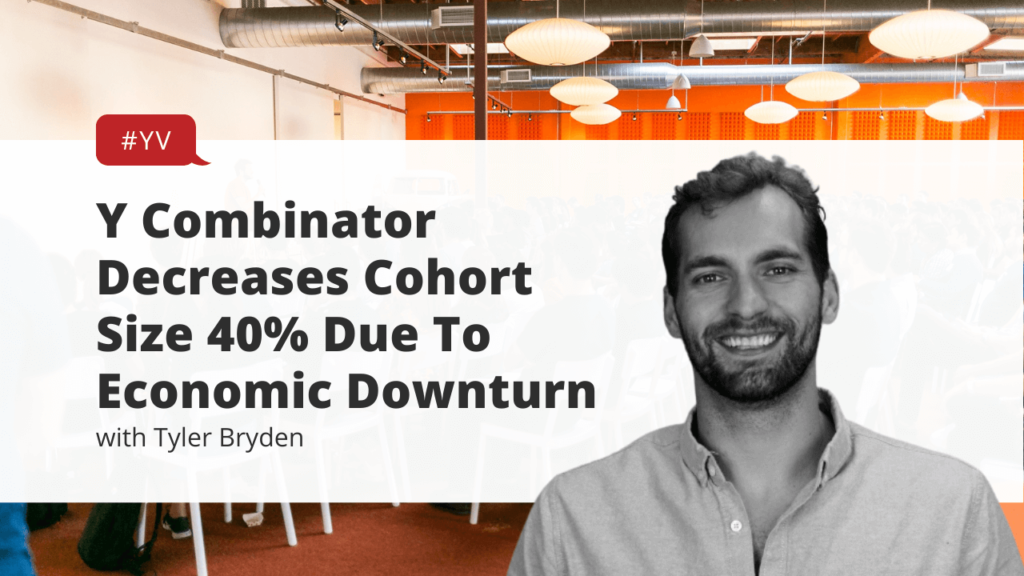Episode Summary
– Summer cohort has 250 companies down from 414
– Due to the economic climate, predicted downturn and in-person programming
– Had recently informed founders to “plan for the worst” and “things don’t look good”
– This follows Y Combinator’s new $500,000 standard check
– Questions around the impact of bigger cohorts on the YC brand
Hashtags
#ycombinator #vc #venturecapital #seriesa #seriesb #seed #seedfunding #seedround #startups #siliconvalley #yc #500startups #techstars #founders
Resources
Y Combinator narrows current cohort size by 40%, citing downturn and funding environment | TechCrunch
YC advises founders to ‘plan for the worst’ amid market teardown | TechCrunch
Y Combinator cuts cohort size by 40% amid market downturn
Y Combinator narrows current cohort size by 40%, citing downturn and funding | Hacker News
Y Combinator Slashes Startup Accelerator Class Size by 40% — The Information
Y Combinator cuts startup class size: ‘We grew too fast’ | VentureBeat
Why Y Combinator Shrunk Its 2022 Startups’ Cohort | CIO Africa
Y Combinator reduces startup accelerator class size by 40% due to economic downturn – Innovation Village | Technology, Product Reviews, Business
Y Combinator’s Warning Letter To Founders, Their Role In Startup Correction & Advice For Startups – YouTube
Y Combinator Cuts Startup Batch Size By 40 Amid Market Downturn – BW Disrupt
Y Combinator reduces existing cohort size by 40% citing recession and funding environment – TechCrunch – Moeara News
YouTube Video
Automated Transcription
Alright hello hello. Hello Tyler Bryden here, hope everything’s going well episode today what are we doing? What are you doing? OK following up on a theme that I’ve been very interested in. That is why Combinator. Why Cominate interesting announcement. I don’t even know if an announcement more something that was confirmed Tech Crunch article came out followed by a bunch of other articles. And the yes so the information sort of verified that the summer cohort 2022 for why Combinator was only 250 companies compared to the 414 companies that the previous cohort. So that’s down 40%. That’s a pretty big drop in the amount of companies in just one cohort, and there have been.
Some sort of foreshadowing of this in a way? Maybe not foreshadowing the cohort was going to get smaller, but that we were heading into an interesting time in the world. Interesting is not a great word either. A dangerous scary time, an economic downturn, and this is what NYC after they had been after this had been verified. Said that. First of all, why C said still relatively large compared to the last batches. Which is true. It used to only do like 10-12. There was an article.
I was trying to see if I can pull it up here from like 2012 where they talked about how they grew too fast and had 66 companies and then they had 84 and how that was too much of a jump for them to handle so you know now we look at 414 in one cohort and we see when things have really changed and there was an article one that I actually didn’t write the article of course, but one that I sort of published a video on about why Combinator sort of letter to founders and this was really interesting. To me because they because they said hey, it’s time to prepare for the worst. This time is coming and. You know, extend your runway. Make sure you’ve got cash cut, you know, not cut your losses, but cut expenses as much as you possibly can. And then I think that became a a signal or an indicator for a lot of startups. But then so many people who are involved in this ecosystem to also follow that advice, and so this sort of was like a warning sign or signal for many of the actions that then started to take place. And since that and I’ve got the video right here, we’re not going to watch the video, but I’ll pull it up just for reference and then talk about.
Sessions. As always. That the things times are changing as they would say, and so we obviously have been. You know, seeing that come to fruition, they had lots of signals in their own, you know, in their own team working out why Combinator and you don’t need to see a picture of my face. Don’t worry about that. They had seen that in the probably the data coming back from the companies that they had invested in and saying, hey, this is how it’s going or hey, we’re losing contracts or we’re unable to fundraise or our valuation is dropping etcetera etcetera and so they had written this e-mail. And here we go. We’ve got a link to it. Here’s a couple of the notes.
Not going to go in depth through it, but you know that’s then created a bunch of discussions. I’m saying, you know, you need to have 18 months of right now. Other people saying you need to have four and really one of the quotes that stuck out. Was planned for the worst and you know no one can predict how bad the economy will get. But things do not look good and and I just think you know with White commented with how plug plug they are in art into the economy into tech companies into businesses that are high growth and driving innovation in the world that it’s worthwhile for us to take a time and think about. You know why are they saying this? What? What do they know that we maybe we don’t know fully and and what? What should we do because of this? And there are some changes that they said sort of around, you know?
That it’s in person programming, and that’s the reason that they’ve. Made some of this shift here as well too, and batch sizes have changed, but. This is definitely, you know 40% a drop in anything is definitely worthwhile taking notice. They do also say that it has a disproportionate impact on international companies and a couple other things that I think stuck out was there’s been an ongoing discussion around the impact of bigger cohorts on the YC brand, and you know, with those tight, very exclusive cohorts in the beginning, some of the great companies that have come out of that it was so you know, refined the amount of companies that got in. And then those were just, you know, cherry pick from greatness. To then go on and became, you know, widely sought after invested in a much higher, much higher chance of of growth and and and and and some term success.
And as these you know, as these YC has sort of opened their reins and gates, and let more companies in, that has that has changed a little bit, and people are more skeptical of the quality of companies. Just like anything you scale up sometimes, it’s hard to maintain that same level of quality and asking, you know, do all those companies deserve to be there where they have been there in the past? And are they worth funding? I’m guessing with what we’re seeing right now in the environment that we’re in that. Some of these companies that had been gone through Accommodator are now facing very difficult times and are not showing signals that they’re going to be successful. And it’s creating even more. Sort of.
Skepticism of the companies that they’re getting. Although I think you know, we have to realize that you know so many people are being impacted by this and you know, just just because you’ve gone through PC doesn’t mean you can withstand market. You know, market crashes and economic environments like this, so I do think there is some caveats to maybe that perspective. But overall, I think people think I’m more personalized experience. If you’ve got 10 companies, 12 companies look at Cal Kanakis.
You know 10 or what, seven or eight per cohort. That personal experience that then can be created. There is really valuable and it allows companies to connect more. And you know ideally get more personalized experience that allows them to accelerate the way that they want and why C isn’t a massive team who are managing all these startups and you know interested to understand, you know will we see layoffs? Will we see change in the size of YC’s?
You know the amount of people who are on the YC team and you know the other thing to consider here is that YC. Just like you know, companies are raising money. NYC is raising money. Obviously they’ve had some big payouts from some of the companies that have been success that have been successful. But overall they’re still raising money to invest in these companies and maybe they’re getting signals that that’s not going to be so easy anymore. And even with the brand as good as YC, they’re having problems. And so then this has had the trickle down consequences of all this and.
NYC since 2005. Funded 3000 startups combined. Market valuation of over 600 billion so they’re extremely successful and the other thing that this sits on the back of is this idea of the new standard check and so previously that check had been $125,000. A $125,000 had been for 7% of the company that have been standard for a long time. That puts you at like 1.1 point, 21.4 million USD valuation and so one of the things that makes sense is that why would they not invest at you if they can invest in you at that valuation? Couple of companies fail. A couple companies do OK, and then there’s a couple. One ones that are big wins. They’re going to reap a lot of rewards from that win when they’re getting in at such a low valuation floor.
Now they’ve moved to the $500,000 standard check, which is really 125 and then I believe a safe note that’s uncapped based on the next round that you do. So basically 375 of that is invested at a later date if you agree upon that, and that would then obviously increase the amount of cost per company they invest in if they’re accepting that, I’m guessing they would accept that and then makes it maybe not available for them to invest as many companies, and I think someone did the math. Might have been Jason on inside about like they had like only if they kept going at the pace of 415 companies per cohort. They only had like 2 years worth of investments where now if they drop this down it’s like 7 years or something. So that’s the environment that they are extending or trying to extend to and.
You know, again, another signal for us in this world that you know maybe we need to be continuing to make adjustments. Other people have pushed back. People said that what YC is saying is hyperbolic hyper. That you know there is cynicism in there that you know those people who are pushing such innovation and greatness. Should you know think that companies take 10 years to build and that.
That this you know they shouldn’t be so skeptical of the environment. When when these companies are in the early stage and have potential for huge growth along the path that a company like them would take. So I do think there’s a lot of sort of say conflicting information from YC specifically, but just a lot of different perspectives, a lot of unknowns right now, and, you know, YCY Combinator here is not falling victim to those unknowns too. But you know, taking a relatively bold stance on where they want to be just. In case things go that worst case scenario like they may have like, they may think that it will so.
My disclaimer at the end of this is that I have I love, I see. I mean, you know I’ve admired them very much. I admire the companies that come out have applied for YC. I’ve had conversations with Michael Seibel from NYC, almost got Nim, didn’t get him. I don’t think I’m holding that grudge, but I do, you know, pay attention to these. And anytime I find that I can make a video about it, it’s fine. So that’s my disclaimer at the end. But overall, looking at this at a pretty unbiased lens, at least trying to and just thinking what does this mean? How do how does this impact me personally?
I mean, it shouldn’t. Maybe it doesn’t, but as we look around for signals in the world that we’re in today, trying to predict how we should act, how should we adapt how we should perform, what decisions we should be making? This one seems like a valuable one, and the rain is now coming down. That’s a sign for me to shut this down. This has been Tyler Briden talking about why see why Combinator decreasing their cohort size by 40% and a little bit of questions that surround that. I hope you enjoyed this video. Hope you got some insights. If you did like comment, subscribe, do the algorithm stuff. Thank you very much and.
Love you very much for checking this out. I appreciate everyone who does those things. Keeps me on the journey, keeps me creating content and I’m thankful to continue to have that motivation and inspiration. Thank you so much. Have a good day, bye.




